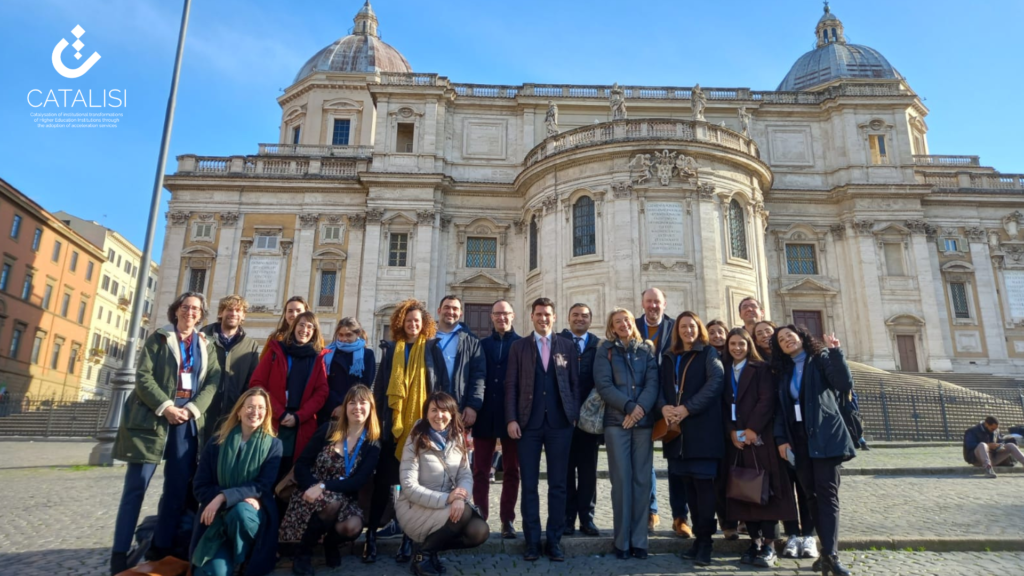The CATALISI project, together with its sister initiatives aUPaEU and Accelerate Future HEI, has undertaken a critical task: identifying key policy gaps and formulating recommendations aimed at the European Commission. The primary objective of this first policy brief is to align high-level European Research Area (ERA) policies and their practical application within Higher Education Institutions (HEIs).
The results of this brief are based upon the activities of the first year of implementation of the three projects. The insights presented in this brief are drawn from extensive data collection, the design and testing of methodologies, and the implementation of acceleration services across various European HEIs and alliances.
Identified Gaps in the ERA Policy Agenda
- Lack of definition for “Acceleration Services: The overall aim of the Higher Education Institutions acceleration services is to help institutions to successfully implement a strategy and roadmap for transformation, but the term “acceleration services” lacks a clear, universally accepted definition. This ambiguity complicates the application and target audience identification.
- Challenges in open knowledge sharing: The diversity of national regulations concerning public information sharing obstructs a cohesive approach to listing and sharing research infrastructures across Europe. This inconsistency challenges the integration and use of the European Open Science Cloud (EOSC), essential for fostering a collaborative research environment.
- Disconnect between ERA policy’s “high-level” principles and HEI implementation: There is a significant gap between the overarching principles outlined in the ERA policy agenda and the practical realities of its implementation at the HEI level.
- Need for a European Community of R&I professionals: Establishing a dedicated community of professionals in research and innovation (R&I) transformation is crucial. This network could facilitate reforms and ensure sustainable change, bridging the gap between policy development and practical application.
The brief aims to ensure that, by addressing these gaps, ERA policies are not only theoretically sound but also practically implementable, thereby enabling HEIs to contribute more effectively to Europe’s research and innovation landscape.
Actions in the ERA Policy Agenda requiring additional support
Many of the key points of the ERA Policy Agenda 2022-2024 underscore the importance of institutional transformation within Universities and HEIs as key contributors to the ERA (European Commission, 2021). The work of CATALISI, aUPaEU, and Accelerate Future HEI supports HEIs transformation in a number of areas such as promoting Open Science and Inclusiveness, strengthening and linking research infrastructures. However, drawing from the insights of all three projects, it is crucial to underscore the importance of ongoing assessments to determine whether individual institutions possess the necessary resources and infrastructure to sustain the implementation of changes over the long term.
Additional support will be needed for
- Open sharing of knowledge (ERA policy action 1): To mitigate the challenges posed by varied national regulations, there needs to be greater harmonization and clear guidelines. This effort could be supported by specialized legal services or networks that assist HEIs in compliance and knowledge-sharing initiatives.
- Research assessment reform (ERA policy actions 3 and 7): Reforming research assessment systems to recognize a broader range of academic achievements beyond traditional metrics is essential. This shift would promote greater innovation and alignment with ERA priorities.
- Transition from macro to micro level (ERA policy action 13): HEIs require more tailored support to adapt broad ERA policies to their specific contexts. This includes providing resources and infrastructure necessary for effective implementation at institutional level.
These recommendations represent preliminary insights, with more comprehensive suggestions to be detailed in our second policy brief, expected in December 2025.
The three projects—CATALISI, Accelerate HEI, and aUPaEU— complement each other through their unique approaches to acceleration services and institutional transformation. The project´s complementarity is particularly focused on:
- Stakeholder engagement and co-creation at each phase of the project activities, to ensure involvement of different perspectives and ownership of the process.
- Data and evidence-based approach to identify the key challenges and opportunities for transformation.
- Institutional transformation and roadmap development regarding becoming entrepreneurial and innovative HEIs, including the identification of opportunities and challenges to address in acceleration services and coaching activities.
- Iterative and agile process methodology has ongoing monitoring mechanisms built in to adapt to the new findings and gaps identified.
- Networking and collaboration through workshops, events and training activities, partners are presented with opportunities to network and build collaborations.
Throughout the first year, the projects have collaborated closely through joint actions, including communication and dissemination efforts, mutual learning events, and policy workshops. They’ve also shared resources and expertise, like by opening coaching and learning events to all partners and collaborating on evaluation and impact assessment. A This collaboration aims to enhance the practical impact of ERA policies on HEIs by leveraging the strengths of each project.
As we continue our work through the CATALISI, aUPaEU, and Accelerate Future HEI projects, we will update and enrich refine these recommendations based on ongoing research and pilot testing.
Stay tuned for further updates as we work towards a more integrated and effective European Research Area.

















